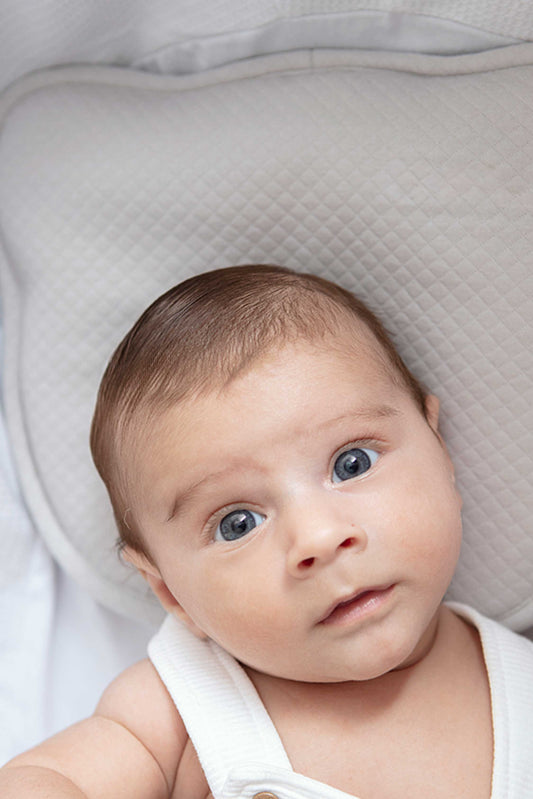Is it normal for newborns to sleep all the time? Why does my baby wake up so frequently? When will he start sleeping longer at night?...
Questions about a baby's sleep are amongst those frequently asked by parents, especially as their own sleep is impacted as a result.
To understand more about infant sleep schedule, we must be fully aware that the newborn sleep wake cycle is completely different from ours, as are the newborn sleep stages (REM and NON-REM phases).
Young infants don’t understand the difference between night and day yet, this is something they acquire gradually from around 4 months old, when they begin to adapt to the rhythm of their surrounding environment. In reality it is us grown-ups who find ourselves having to adapt our rhythm to theirs – especially during the first few months.
Why do newborns sleep so much?
During the first few weeks of life, babies can sleep for up to 20 hours a day. Don't worry, this is completely physiological!
Sleep is vital for their growth and development of essential skills, as it:
- Promotes brain development
- Consolidates memory
- Helps them learn from stimulation
- Encourages the secretion of growth hormone
- Strengthens the immune system
- Helps the brain to cleanse itself of toxins.
Why do newborns wake up at night? Are they hungry?
It’s not just hunger which causes little babies to wake up several times during the night. Although it’s true that they do need to eat at short intervals, usually ranging from every 2.5 to 4 hours.
The other reason why newborns wake several times through the night is due to the natural sleep cycle of infants, which is generally much shorter than those of adults.
Our own sleep stages last around 90 minutes, and we wake up after a certain series of cycles. Infant sleep stages last about 50 minutes, which is why they wake up much more frequently!
How newborn sleep patterns work
Baby sleep is very different from an adult’s sleep: the difference lies in the various sleep stages, which differ in duration and in the order in which they occur.
An adult begins sleep by gradually passing through the four non-REM stages before entering the REM phase. This cycle lasts around 90-120 minutes and is repeated four to five times each night up until a person has slept for about 8 hours.
The newborn rem sleep, on the other hand, begins with the REM phase and then they enter the first two stages of NON-REM sleep. In total each newborn baby sleep cycle lasts about 50 minutes, after about 3 cycles an infant wakes up.
During the infant rem sleep stage, you may notice your baby twitches or jerks and makes various facial movements such as frightened expressions or smiles. These are signs of brain activity which characterise this particular stage: your baby's brain is learning and re-processing all the stimuli they were exposed to when awake.
Their newborn sleep schedule gradually changes, becoming progressively more similar to that of adults.
Newborns and sleep schedule
During the first month of life, a newborn baby doesn’t differentiate between night and day and will spend most of their time sleeping, even up to 20 hours per day.
They haven’t established sleep stages yet, so they will easily switch from being awake to sleep.
Baby sleep cycle at one month
At around one month old, infants begin to interact more with their surrounding environment, being more observant and curious when awake. They still sleep for around 15 hours a day, waking up every 3-4 hours.
Baby sleep cycle at two months
Your baby is beginning to acquire our circadian rhythm, we notice when this is happening as they tend to sleep for slightly longer intervals at night.
Baby sleep cycle at three months
They begin to fall into deeper sleep and sleep for less during the day and longer at night.
Baby sleep cycle at four months
At around four months old, a baby’s sleep schedule shifts mainly to nighttime, with sleep cycles as long as six hours each.
Sleep stages lengthen to around 70 minutes, and they fall into a deeper sleep.
How much do infants sleep at this age? The average amount is between 12 to 14 hours per day, with most of their sleep occurring at night.
Baby sleep cycle after 6 months
By the time your baby is 6 months old, they should have a clearly defined sleep-wake rhythm pattern, with most of their sleep concentrated at night and just 2 or 3 naps throughout the day.
Sleeping all through the night without waking up is still a long way off, in fact at around 8-9 months babies tend to experience an increase in night wakings.
At this age, it is a good idea to have a firmly established daily routine, with short naps so they don’t impact on their nighttime sleep, going to bed at the same time each night and a good baby bed time routine both help an infant to fall asleep peacefully.
What do we mean by a bedtime routine? A nighttime ritual that involves repeating the same actions every night in the same order, such as, a bath and a bedtime story.
REM stage and NREM stage: what’s the difference?
During REM phase our brain is active: this is when we dream, review everything we’ve learnt during the day and process negative emotions to help shed them. We have no control, however, over our physical body, which surrenders to sleep completely.
This process differs for infants: their nervous system hasn’t matured yet and they haven’t learnt how to block signals from their brain to their muscles. This is why they may seem to fidget around when sleeping: they groan, open and close their eyes, move their arms and legs around, and wake up easily.
There are four stages of NREM, classified according to how profound sleep is. Up to 4 months old, babies only experience the first two stages, which is why they never fall into a deep sleep! However, unlike the REM phase, their body is heavier, and they appear more relaxed when asleep.
Why does my baby sleep better when being held or inside their sling?
Every time an unborn baby moves inside their mum’s tum, they are in a confined and compact space with boundaries they can physically feel. They don’t know what it feels like to feel emptiness around them until they are born.
That’s why they love contact with adults: it’s this physical contact which provides infants with that familiar feeling of boundaries once again. That’s why a newborn sleeps better when being held in your arms, and starts to cry as soon as you put them down in their crib.
Responding to a baby’s need for contact does not mean spoiling them, quite the opposite. Although, it’s difficult to hold your baby all the time, as that would mean you wouldn’t be able to do anything else! That's why a baby carrier or baby wrap can be a great help.









